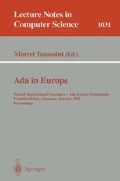Abstract
This paper presents an approach for the development of reusable, reliable distributed systems using the HOOD4 code generation principles for implementing Object Oriented Designs over different target systems (ADA95, C++), possibly distributed.
HOOD4 is an extension of HOOD supporting classes and inheritance for multiple target systems. HOOD4 provides an Object Oriented framework by means of the HOOD RUN TIME SUPPORT library together with a design approach and associated code generation rules, shiedling applications from complex semantics differences between OS platforms.
We first recall the terminology between modular and Object Oriented Programming (OOP), and give a description of HOOD extensions to support OO classes and inheritance, with emphasis on the concept of virtual node. We then present the target code structure asociated to the HOOD4 entities and associated code generation rule. We conclude with the presentation of an associated development approach for developing large client-server information systems leading to efficient reusability.
Preview
Unable to display preview. Download preview PDF.
References
Ada9X Mapping/Revision Team (1994), Annotated Draft Version 5.0 of the Programming Language Ada, and Rationale for the Programming Language Ada, Version 5.0, Intermetrics, ISO/IECJTC1/SC22 WG9 N 207
Burns A; A.Wellings (1989), Real-Time Systems and their Programming Languages, 1989 Addison-Wesley Press
Gamma E., R. Helm, R.Johnson and J.Vlissides (1994), Design Patterns: Elements of Reusable Object Oriented Software, MA: Addison-Wesley
HOOD Technical Group(1993,1995), B.DELATTE, M.Heitz, JFMULLER editors, “HOOD Reference Manual”, Prentice Hall and Masson, 1993 and “HOOD Reference Manual release 4”, to be published 1995.
HUG “HOOD User Manual” (1995) C.Pinaud, M.Heitz editors HOOD USERs GROUP A.I.S.B.L.” C/O SpaceBel Informatique, 111, rue Colonel BOURG, B-1140 BRUSSELS, Belgium tel (32).2.27.30.46.11 fax (32) 2.27.36.80.13
Meyer B, (1990)“Object Oriented Software Construction” in ISBN 0-8053-0091, Benjamin Cummings
OMG,(1991)The Common Object request Broker: Architecture and Specification, OMG doc.
Sourouille JL, H Lecoeuchc(1995), Integrating State in an OO Concurrent Model, Proceedings of TOOLS EUROPE95 Conference, Prentice HAll
Strousoup B(1991) The Annoted C++ Reference Manual, Addison-Wesley Press
Vinoski S(1993) Distributed Object Computing with CORBA, C++ Report, vol 5
Vinoski S, Schmidt D(1995) Comparing Alternative Client Side Distributed Programming Techniques, C++ Report, 1995 May/June 1995 issues
Schmidt D, ASX ('1994): An Object-Oriented Framework for Developping Distributed Applications, Proceedings of the 6th USENIX C++ Conference, Cambridge, MA, April 1994
Schmidt D,Stephenson P(1995) Using Design Patterns to Evolve System Software from Unix to Windows NT C++ Report, 1995 March 1995
Author information
Authors and Affiliations
Editor information
Rights and permissions
Copyright information
© 1996 Springer-Verlag Berlin Heidelberg
About this paper
Cite this paper
Heitz, M. (1996). Achieving reusable and reliable client-server code using HOODTM automated code generation for ADA95 and C++ targets. In: Toussaint, M. (eds) Ada in Europe. Ada-Europe 1995. Lecture Notes in Computer Science, vol 1031. Springer, Berlin, Heidelberg. https://doi.org/10.1007/BFb0015512
Download citation
DOI: https://doi.org/10.1007/BFb0015512
Published:
Publisher Name: Springer, Berlin, Heidelberg
Print ISBN: 978-3-540-60757-1
Online ISBN: 978-3-540-49362-4
eBook Packages: Springer Book Archive

